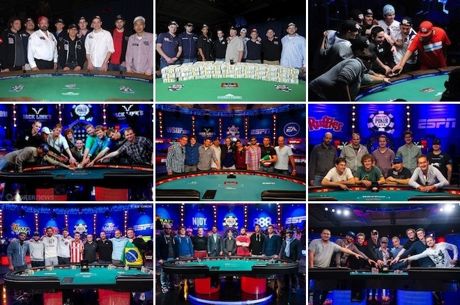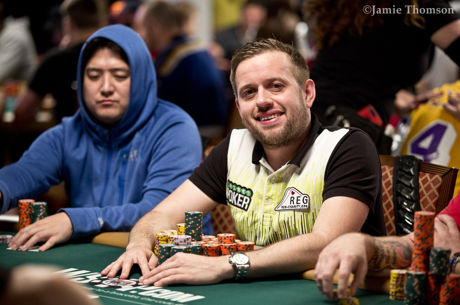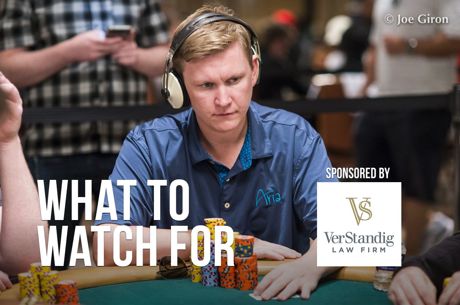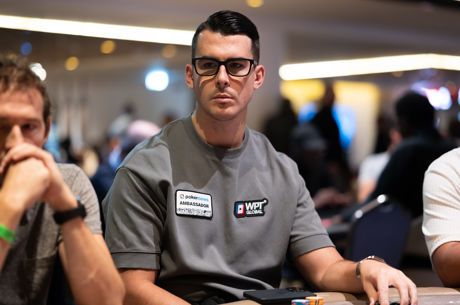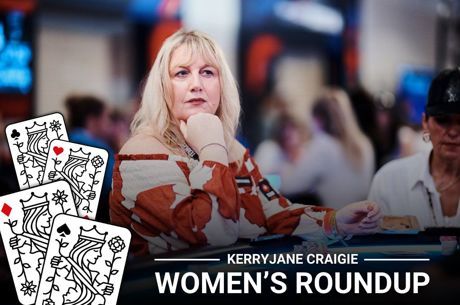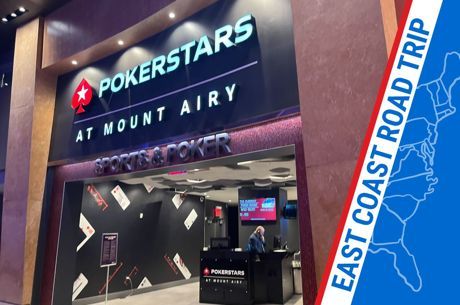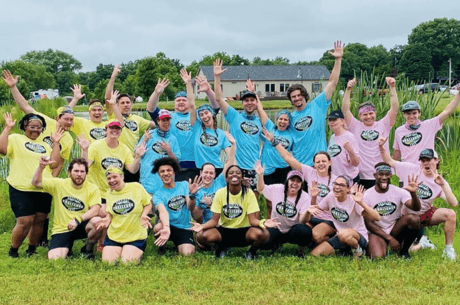PN Blog: My Journey to 29th Place in the WSOP Main Event
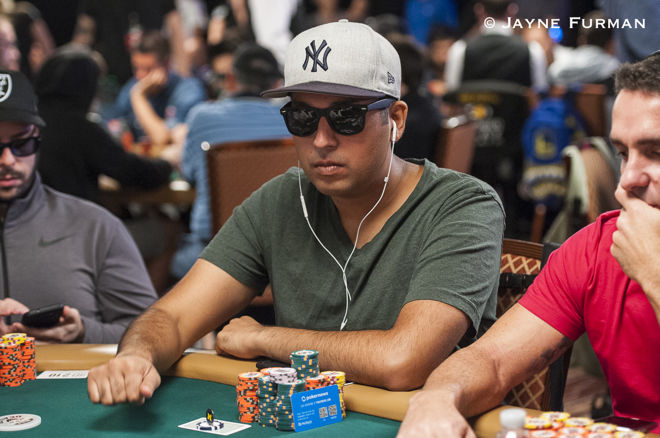
Winning the World Series of Poker (WSOP) Main Event is a dream for every poker player in the world. This is the story of my journey as I gave it my best shot.
Preparation
Who knows how many chances one will get to play in the Main Event? Family, kids, mortgages, work, and money all get in the way. I had played three times before and busted out on Day 1, Day 3, and Day 2, respectively. Is this just another waste of $10,000 and five vacation days? Do I have enough confidence in my poker game to put up $10,000 of my hard-earned money on a card game where I will be undoubtedly competing with people who do this for a living?
I have often fantasized about becoming a professional poker player. While working full-time as an options trader at the Chicago Board of Trade, I managed to play about 20-30 hours per week. This year, I played over 100,000 hands of PLO online and was profitable. Despite this, I always wondered if I had what it takes to compete at the highest level.
After careful deliberation with my wife, I decided in April that I wanted to take a shot. And knowing that chances like this are few and far between, I was going to do everything in my power to maximize my chance for success. I began to formulate a game plan of the steps I would need to complete leading up to the Main Event in July to plug my leaks and get my game to where it needed to be.
There were three main areas that I wanted to focus on for my training. First, I watched about 80 hours of Run It Once videos. Second, I sought advice from my friends Mohsin Charania, Sunny Patel, and Jeremy Menard. These guys have each played professionally for almost a decade and were always willing to mentor me. In fact, Jeremy was an instructor on Run It Once. Pretty amazing to watch a video of a top pro, and then be able to call him to pick his brain. Lastly, I played about 100 online tournaments. This gave me the opportunity to utilize the techniques and strategies that I learned from the training videos.
Arriving in Las Vegas
I landed in Las Vegas on Friday, July 7. I rushed to my room at the Cosmopolitan to play the $1,000 WSOP.com Online Championship bracelet event. This would be a great primer as many of these players will also be competing in the Main Event as well. I was able to chip up, early but as the money bubble came close I had four-bet all-in with KK and had two callers. My two opponents held KK (same hand as me) and AJ offsuit. A very unlucky spot to have pocket kings as we each have about 1/3 equity in the hand. The flop was Q39, turn A, river 7, game over.
The next day, still salty about my bustout from the online event, I chose to play some live 5/10/20 PLO at the Aria. I would be playing the Main Event the next day and did not want to overexert myself. I played about six hours and had a big all-in towards the end of my session. I held an open-ended straight draw and the nut flush-draw, while my opponent had top set. I asked him if he’d be willing to run it twice, and he said no just once. The river was a blank and the dealer pushed my opponent the $6000 pot. Not a good start to the trip.
Down about $4,000, I headed to the Rio Saturday night to register for Day 1B for Sunday, July 9. I waited in line for about thirty minutes and gave the cashier my $10,000 in cash in exchange for this:
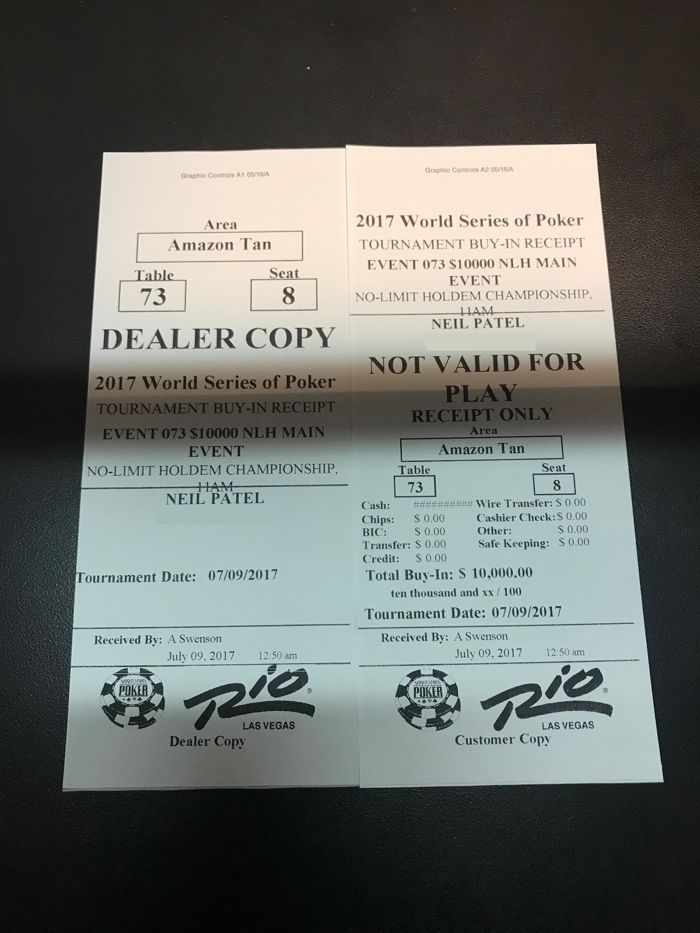
Day 1
I woke up at about 9 a.m., got ready, ordered room service for breakfast and listened to the WSOP Main Event mindset coaching on the app Primed Mind. This app was created by Fedor Holz, another top player in the tournament world, and assists with helping focus for poker events. It gave me concrete tips that I used throughout the tournament.
I was the first to arrive at my table. Amazon Room. Table 73. Seat 8. One by one, my opponents started to stumble in. The first was Seat 2, a first-time WSOP entrant, who was an elderly gentleman from Boston, who typically played small stakes. The second was Seat 9, a retired man from Alaska who spent his free time making moonshine. So far, so good. Next in Seat 3 was the 2010 Main Event champion Jonathan Duhamel and a young aggressive online player in Seat 1. It was typical of what makes the Main Event so incredible, world champions, moonshiners, and options traders all playing the game they love. My favorite moment was when Seat 4 asked Duhamel if he had ever cashed in the Main Event before. He humbly responded he final tabled it once before. I conveniently pointed out the giant poster immortalizing Duhamel’s 2010 win over his right shoulder.
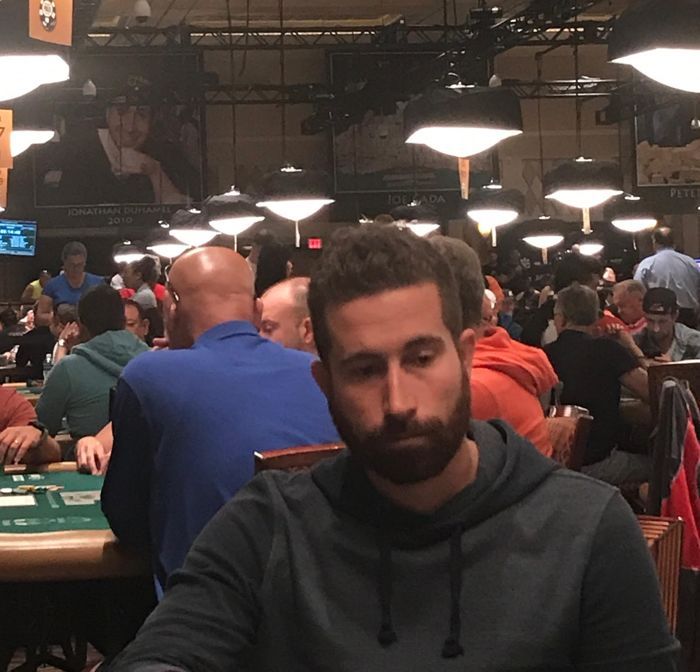
The day was a roller coaster. The starting stack was 50,000 chips and after the first two levels I was down to 35,000. I had lost a big hand when I had flopped two pair and my opponent had rivered a flush. It was dinner break and my friend Sunny (who has made a few WSOP final tables) had messaged me to meet him outside in an Uber. I jumped in the car to notice someone else already in the car — Connor Drinan (GPI Top 15 player). I had met Connor once before two years ago, the night he busted out of the One Drop tournament. He has since become a superstar on the poker tournament scene, widely regarded as one of the best tournament players in the world.
The dinner really helped me relax. The three of us went to a Thai restaurant, shared stories of hands, and I was able to ask two pros strategy questions for the better part of 90 minutes. I returned from dinner refreshed and relaxed. I was able to chip up to 92,600 to end Day 1. I went back to the Cosmopolitan happy to have made Day 2 with an above average stack.
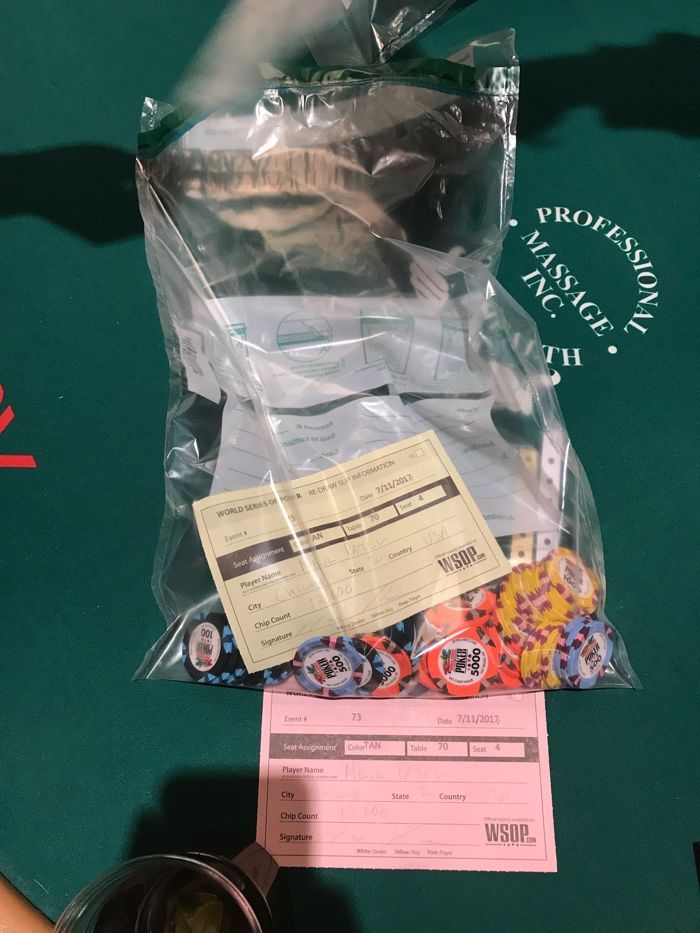
Day 2
I arrived at the Rio for Day 2 and get to my table only to find the wrong bag of chips. It was for Neil Patel — but not me, another Neil Patel (a frequent problem in my life). There was another person with the same name who from St. Louis who also made Day 2, and I did not have a seating assignment. I frantically ran to the tournament director and he was able to find me an open seat, and find my bag and placed me there.
I was very frustrated because I had with the assistance of my friends, scouted the wrong Day 2 table. Having information on my opponents such as experience/skill level is incredibly valuable. I messaged my Chicago poker crew (Harshal, Dimitar, Jim, Joel, Joe, Sam, and Chris) my new table opponents and they diligently sent me all available information.
I went to dinner with Sunny and another top pro from Toronto, Shyam Srinivasan and continued to pick their brains on strategy. I would describe in detail every hand I played and ask them how they would have played, what they would have done differently. I was mostly able to increase my stack through pre-flop aggression as many of my less skilled opponents were not defending their blinds at an optimal frequency. I also took some passive lines post flop to control the size of the pots and induce bluffs. I made it through Day 2 without a single all-in. I was able to increase my chip count to 133,600, just around the average stack.
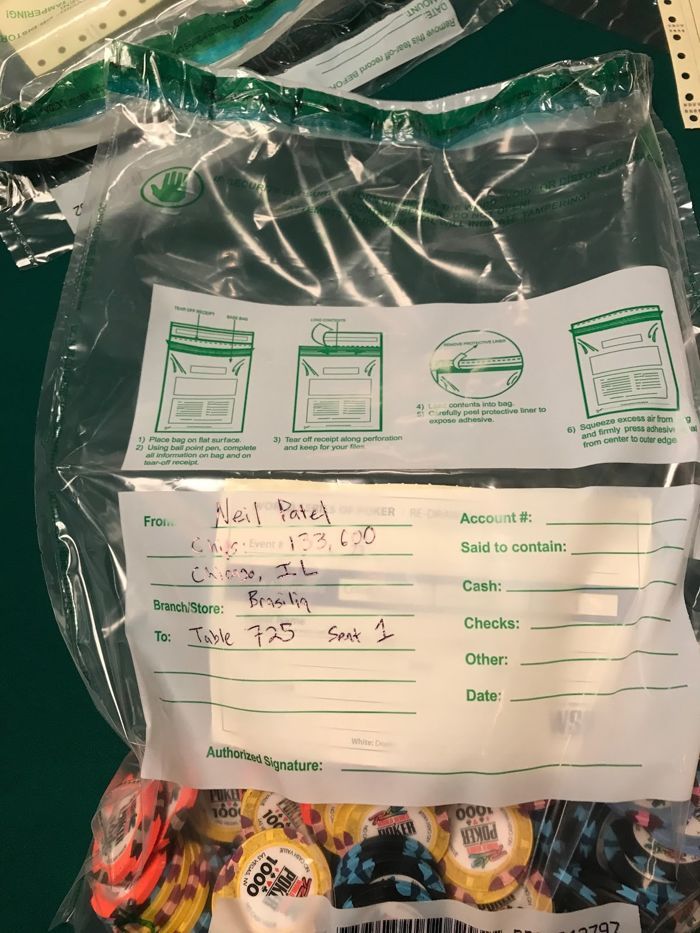
Day 3
I walked down the long hall of the Rio and headed towards the Brasilia Room. The importance of the day weighed on me. Of the 7,221 entrants in the Main Event, 2,572 had made it to Day 3. We would be playing until we were in the money — until 1,084 players remained. Although the minimum cash was only $15,000 (a $5,000 profit) the psychological benefits of cashing the Main Event meant much more. It would be the difference between burning $10,000 or validation in my preparation and acumen in the game I love.
My strategy of pre-flop aggression and attacking capped ranges was not going to work on Day 3. The players were considerably better than I had encountered the first two days of play. Also, Liv Boree, a well known pro, was sitting to my left and had a large chip stack. I began to take much more passive lines and tightened my preflop opening ranges.
One interesting hand was when I opened in middle position with QQ and a man in his 60s from Alabama in the small blind called. The flop was 234 rainbow, he checked, I bet 8,000, he raised to 26,000, and I called. The turn was a 6 and he quickly moved all-in. Generally older players are tighter poker players and unlikely to run massive bluffs. My hand was very strong pre-flop, but a pair of queens does not play well when the small blind moves all-in on the 2-3-4-6 board. He could easily have called from the small blind with hands like 22, 33, 44, 55, 66, that are all currently dominating me.
I thought for a full five minutes about the call as it would commit about half my remaining stack. My opponent then called the clock on me, and the tournament director came to the table and began to count down the clock. I had 30 seconds to make a decision. I stared at my opponent to pick up any information I could; he looked very comfortable. As my time expired, I folded the queens face up. He was in shock and said, “amazing fold”. He showed KK and was slow playing a monster. If he had played it differently and showed more aggression preflop, I definitely would have doubled him up.
Despite making the correct fold, I was disappointed my chip count was going in the wrong direction. I walked down the hall in the Rio and stumbled upon a vendor selling decorative card protectors. I spotted one of my alma mater, University of Michigan, and bought it hoping it would serve as a good luck charm.
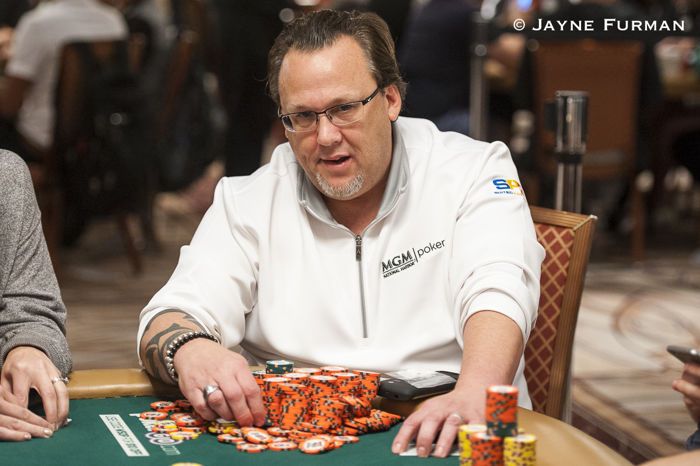
As the day progressed, we approached the money bubble. Many players began playing extremely tight as they just wanted to fold until they were in the money. I began opening close to 50 percent of my hands as I wanted to capitalize on this and steal the blinds and antes. Towards the end of the level, I got into a huge hand with Mickey Craft — a very animated character who received considerable media coverage during the Main Event. He brought a full fifth of Patron to the table and was drinking it shot by shot. In between, he was using the bottle as a card protector. Not what I was expecting from the big stack on Day 3 of the Main Event.
I opened from middle position with AQ offsuit. Craft called from the cutoff and the blinds folded. The flop came AQ3, about as good as I could have hoped for. I made a small continuation bet and Craft flat called. The turn was an ace, giving me the stone nuts. I bet 40,000 into a pot of about 75,000 and Craft raised to 155,000. After playing with Craft for a few levels, I noticed his sizing was much bigger when he had stronger hands. A nearly 4x raise of my bet on the turn was a very strong play, and in nearly all situations I would just flat call with the nuts and give my opponent an opportunity to bet on the river. I was positive he didn’t have QQ as he would have 3-bet me preflop, so I was putting him on either Ax or 33. Given that I was putting him on such a strong range and he was about two-thirds done with the bottle of tequila, I decided to move all-in. I thought he would pay me off with Ax or 33 on that board.
Media, cameramen, and players from other players swarmed our table as this would be one of the largest pots of the tournament to that point. He thought for about ten minutes and then ultimately folded, claiming to have 33. I had won the pot but was torn if I had misplayed the hand. Should I have flat called and let him bet on the river? Should I have raised a smaller amount on the turn? Should I have flatted his turn raise and led out on the river? To this day, I am still upset with my play in the hand. Recap here.
Play slowed down considerably as we waited for the last few bustouts. We were forced to play a sixth level, until almost 2:30 a.m. Finally the money bubble had burst and 1,084 players remained. I had cashed the WSOP Main Event. The room roared as many cheered and applauded cashing the biggest annual poker tournament in the world. I bagged 783,000 chips to go into Day 4. I was beyond thrilled. All the work I had put into my game over the years seemed validated in an instant. And although the $5,000 guaranteed profit was far from my biggest score, it felt like the biggest accomplishment in my poker career.
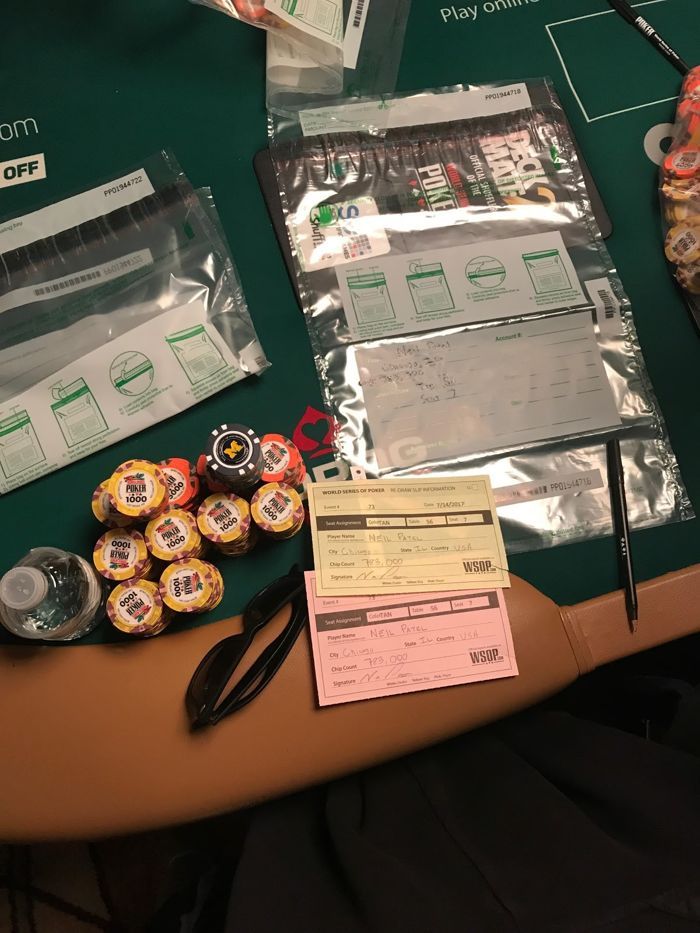
Day 4
The day started off incredibly well. I was able to knock out three players in the first level and chip up from 783,000 to 1.3 million. Players were knocked out of the tournament at a furious pace as many were clinging onto a short stack just to get the minimum cash. In the first two hours almost 300 of the 1,084 players were knocked out.
My table was then broken and I was moved to Table 23. This table proved to be exactly the opposite as I chipped down to about 685,000. After two hours, this table broke and I was moved to a table in Brasilia with a three-time bracelet winner, Dominik Nitsche.
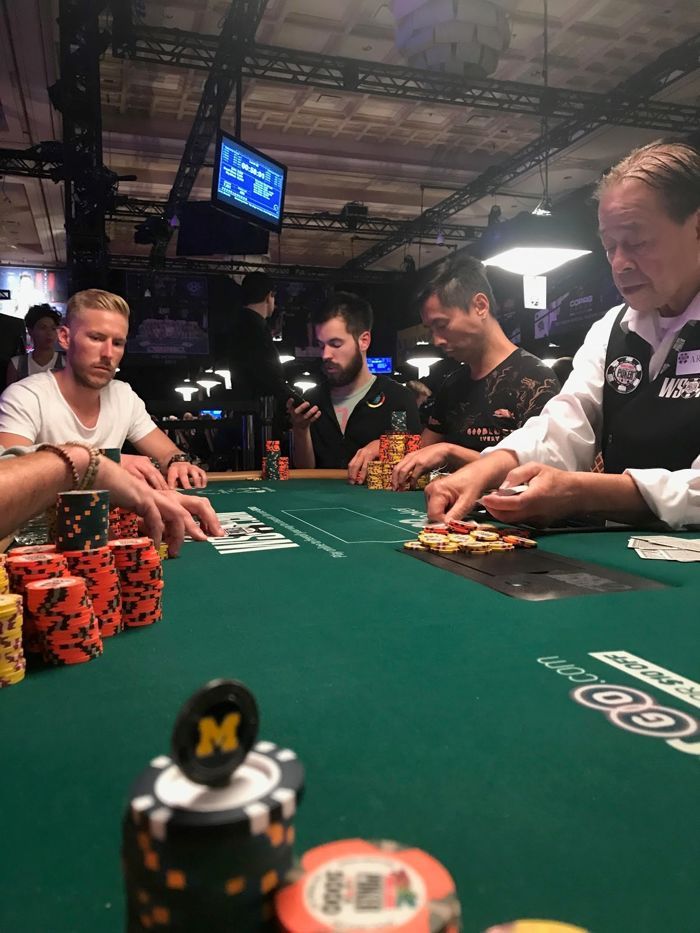
On my first orbit at this table, I was sitting under the gun and dealt AA. Naturally, I opened to 30,000 and then the woman to my left — a doctor in her 50s playing her first Main Event — three-bet me to 82,000. Everyone folded until the button four-bet to 300,000. This is a dream scenario when holding the best starting hand in poker.
Action folded around back to me, I tanked for about five minutes, and moved all-in for about 625,000. My opponent called rather quickly and showed 85 suited, a very marginal hand. My aces held and I had chipped up to about 1.3 million. Recap here.
I found this table to be very tough, but continued to chip up. I was able to bluff Nitsche out of a large pot when I held blockers to a straight. I was able to bag 2.1 million at the end of the night.
Fatigue began setting in as the 14 hour days took a toll on me. No one was getting more than four to five hours of sleep a night. The Main Event is truly a mental marathon. Endurance is just as important as skill. 297 players remained in the tournament including my friends Sunny (2.7 million) and Shyam (1.45 million). They both continued to coach me on every break, and helped me immeasurably.
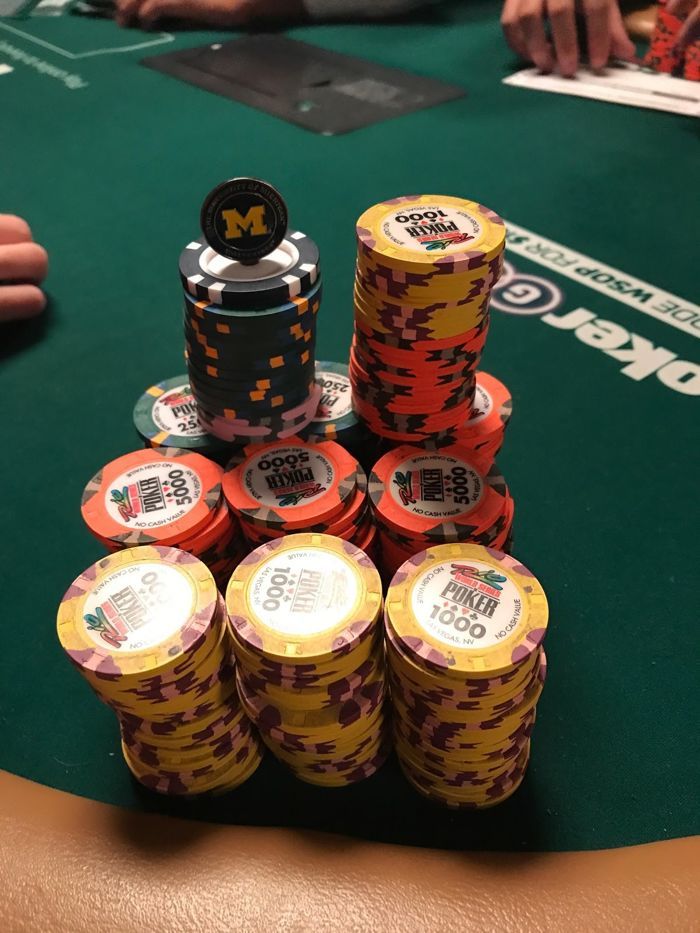
Day 5
I received my daily scouting report of my table from my friends. The only well-known player at my table was Timothy Adams. Mohsin described Tim as one of the best players in the game. So, I was elated when he was the first one busted from our table as his TT lost to AA. The man who took his seat, John Hesp, would soon become world famous.
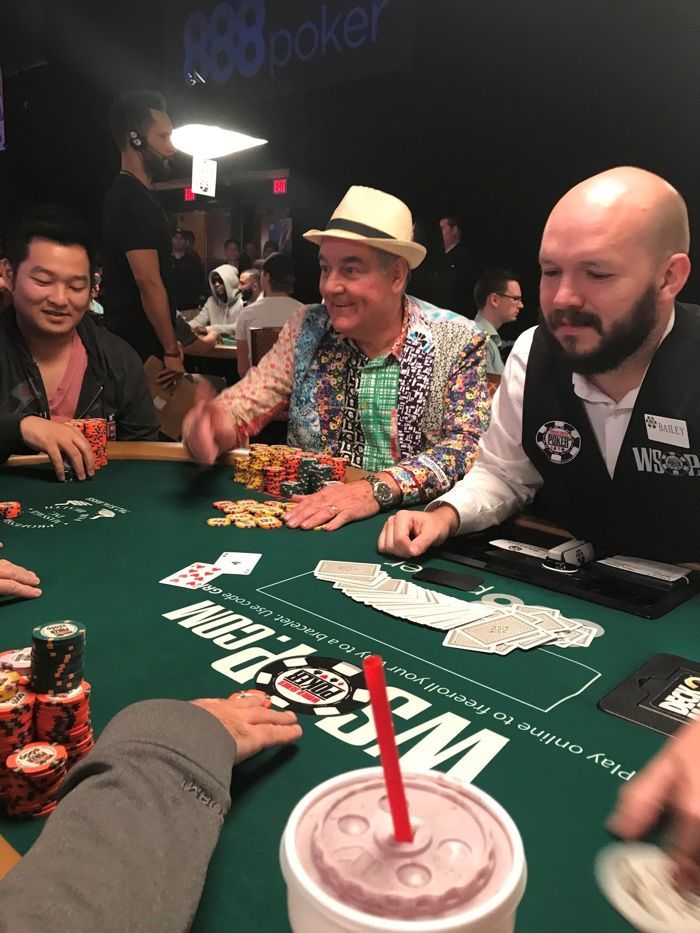
Hesp was a recreational player from Bridlington, England, who played a very unorthodox style and was constantly putting opponents to tough decisions. His good nature was infectious and the table developed a strong camaraderie.
At one point, Hesp faced a four-bet all-in shove from Wen Zhou. Zhou had AQ, but Hesp quickly called with KK. Zhou was able to spike an ace and win the hand. Hesp chuckled about losing the pot and walked over to Zhou, said “congratulations,” and shook his hand. I was amazed at how much fun he was having, how he wasn’t tilted about getting unlucky. He helped put what we were doing in perspective. Every bad beat weighed on me like my life was ending, every decision could be my last. Hesp reminded me that we were playing a card game.
This table has to be the single most memorable table of my poker career. We seemingly had a three-bet or four-bet preflop on every other hand. I was particularly impressed by the play of Ihar Soika, a young pro from Belarus. Fabio Sousa, a pro from Brazil, was seated to my direct left and was the single most aggressive player I have ever played with. Wen and I would share a look of awe every time he reached for chips.
As dinner break approached, I texted Sunny and was shocked to learn he had busted out in 152nd place. He started the day with 2.7 million and was playing great poker. I really believed it was his year to final table as I’ve witnessed him run bad in so many big spots in poker.
I went to dinner with Shyam, Connor, and two other pros, Ankush Mandavia and Brandon Meyers. I described my table to Shyam and Connor and asked for advice. How to adjust to the dynamics of my table, how to size raises in certain situations. I sat back and smiled as I realized how lucky I am to pick the brains of some of the top players in the world on dinner break of Day 5 of the WSOP Main Event.
When I returned from dinner I played the tightest poker I had thus far in the tournament, feeling my patience would be rewarded versus my overly aggressive opponents. Initially it had as I was able to chip up to 3.8 million. On the last level of the day, as opponents busted out from my tables, new ones were brought in. In Seats 7 and 8 came Dan Ott and Jonas Mackoff. I texted my friends for any info on the two players. I was told Ott was aggressive and spewy and Mackoff was a good, capable player.
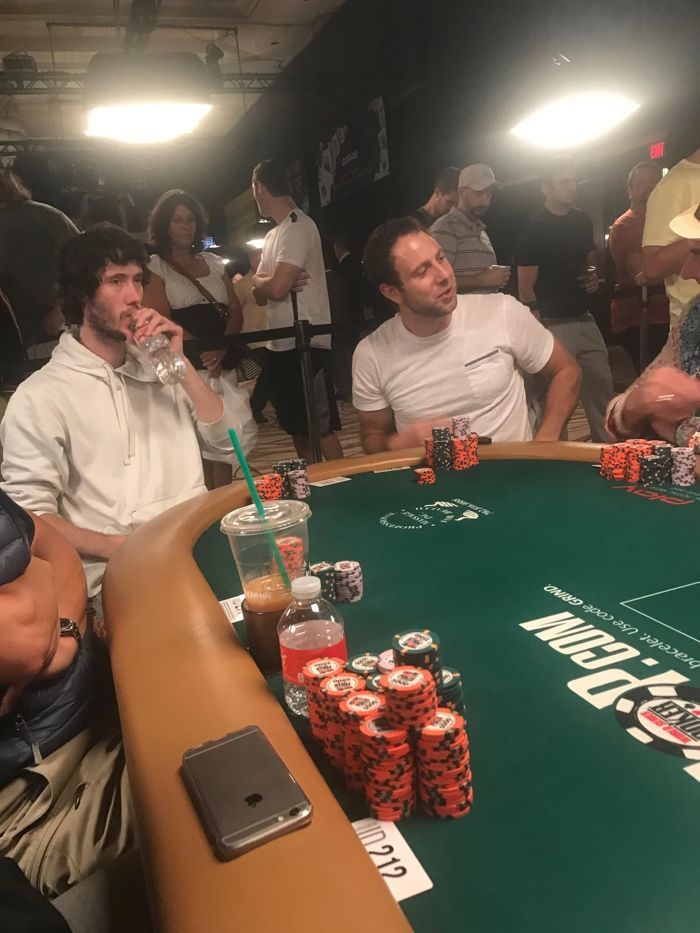
On the last level of play for Day 5, I was particularly card dead. My chip count was beginning to decline. On the third to last hand of the night, Ott opened from middle position and I called from the big blind with 99. The flop came JJ3, and I check-called Ott’s bet of 100k, the turn was a 4, and I check-called 250k. The river brought a 5, and I checked, and Ott bet 1.3 million, into a pot of 800,000. A very polarizing bet, he either has a strong jack/full house or complete air. I tanked for 5 minutes and folded. As the day ended I asked Ott what he had, he smiled and said “I can’t tell you that one.”
I was able to bag 1.9 million at the end of Day 5. Eighty-five players remained in the 2017 WSOP Main Event. It was very bittersweet. I was thrilled to make it this far, in the top 100, on to Day 6 of the tournament. But I was distressed I managed to decrease stack from the start of the day.
I was also shocked to learn Shyam had busted out from the tournament. He was one of the chip leaders every day of the tournament and had really impressed me with the confidence in his game. He focused much more on theoreticals behind poker and he would teach me concepts effortlessly. Even though I had met him just a week earlier, we had really bonded throughout the tournament. Something about going through all those experiences together, every break, every dinner.
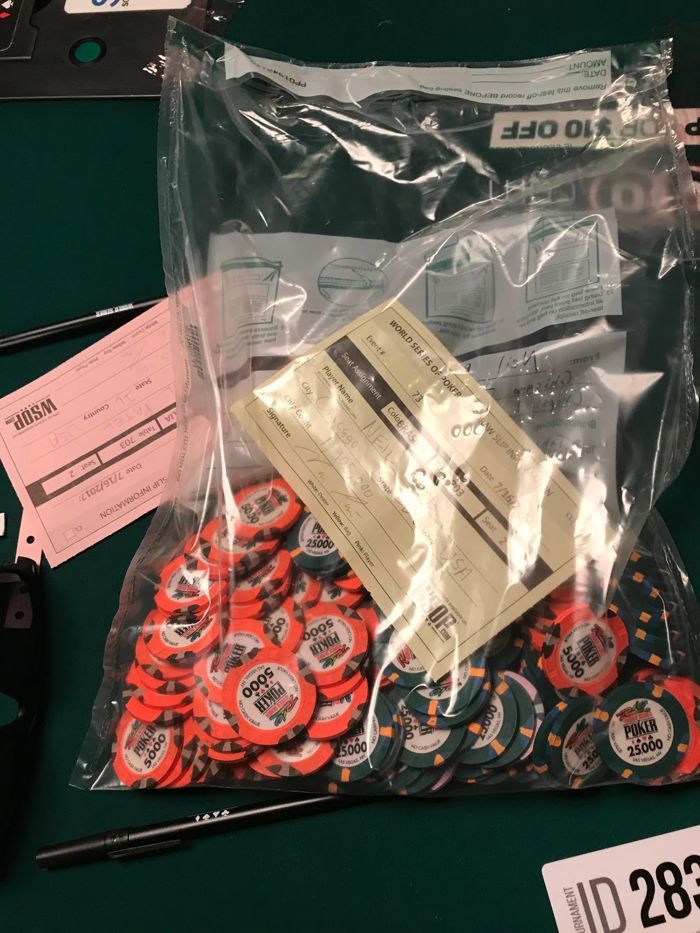
We bagged the chips around 1 a.m. that night and my reservation at the Cosmopolitan had ended and I needed to check-in to my new hotel room. By the time I picked up my luggage and got into my new hotel room, it was 4 a.m. I sat in bed for the next hour as my adrenaline rushed through my body. I scrolled through my phone looking at all the coverage I missed because I was still in the tournament. I looked through all the emails, texts, Facebook messages, from my friends and family who were so incredibly supportive, so happy for me. I was able to get about three hours of sleep that night.
Day 6
Unfamiliar with my new hotel, I was running late for Day 6. I arrived at the Rio around 10:55 a.m., just five minutes before play was scheduled to start. As I entered the Brasilia room I realized that I was on the outer feature table. My table would have three players who final tabled the WSOP Main Event in past years. Michael Ruane, Antoine Saout, and Kenny Hallaert. ESPN took my photo and made me fill out a short bio. This was getting real.
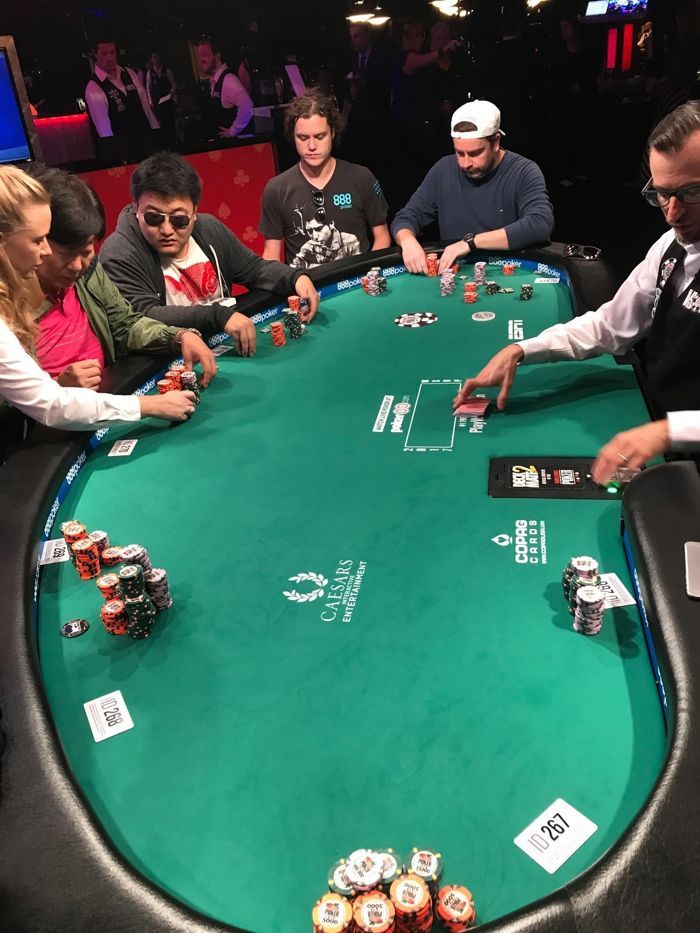
I was able to start off well. I three-bet jammed my AA and Hallaert called with AQ. I would double again as I got incredibly lucky when I three-bet jammed my 66 and spiked a set against QQ. I was up to almost 6 million in chips.
After about two hours of play, Ben Lamb was moved to our table and we would all move to the feature table. The cameramen put a microphone on each of us as we took our seats on the feature table. The money or the game never flustered me, but the bright lights and the cameras definitely got me nervous. For the first time in my life I would be on TV. For the first time, everyone would see how I play poker.
My friend Sunny, graciously decided to come to Rio to support me. He brought me coffee and food. He coached me in between hands. He had his laptop with the live stream so he was able to give me my opponents holdings after they aired on the stream. The Rio is just about the last place on Earth any poker player wants to be right after they bust the Main Event, so I was incredibly appreciative for Sunny’s help.
We were scheduled to play until there were 27 players left. The last 27 would proceed to Day 7. On the last level of play, my foe from Day 6, Dan Ott, joined our table. My stack dwindled as I was card dead. The ICM implications dictated I tighten my range and let the smaller stacks bust so I could make the next pay jump.
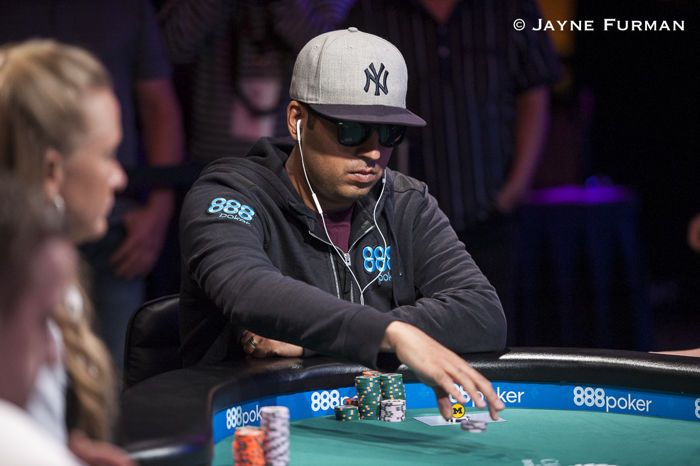
Ott had been opening many hands because of his big stack. He knew players had tightened up and was taking advantage of that. He opened from early position and I moved all-in with AT off-suit. He asked the dealer for a count, and after about a minute, called. He had A9 off-suit. I ran to the rail and said “HOLD ONE TIME!” to Sunny. The dealer proceeded to deal 9-8-6-A-8, and Ott won the pot. I was eliminated in 29th place.
All the air had been sucked out of me. There are few stronger gut punches in life than losing a 70/30 for 7 million chips on the last level of Day 6 of the Main Event. I looked over at Hesp in Seat 6 and was reminded that we were just playing a card game. I went around the table and wished everyone good luck and slowly walked out of the Brasilia room. I shook Ott’s hand as he said, “Sorry man. By the way, I had AJ yesterday, good fold.” The WSOP gave me a yellow card that looked like something a car wash would use for frequent customers rather than my claim to $214,913.
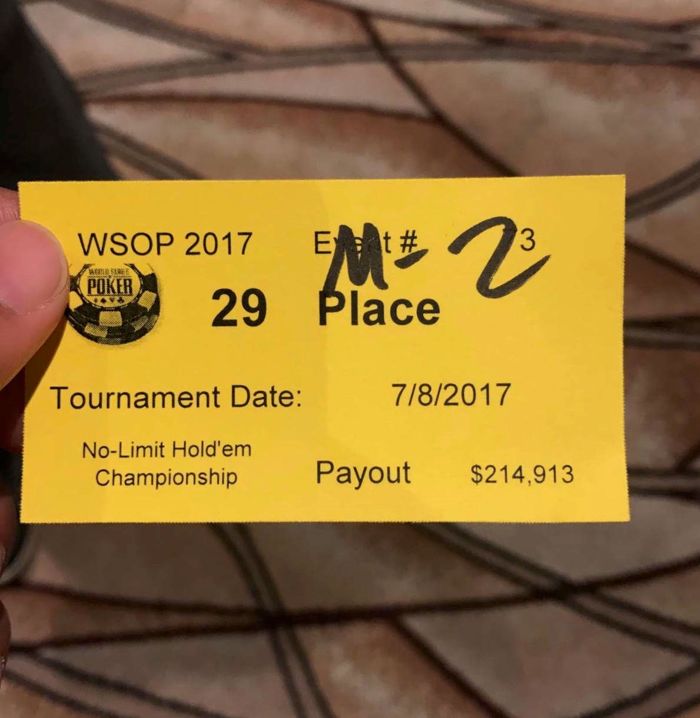
I woke up the next morning to most unbelievable outpouring of love and support from my friends and family. My wife, who had endured so much of my obsession with poker throughout our marriage, was my biggest fan. She had never been prouder of me. Friends I hadn’t talked to in twenty years were getting in touch with me, saying they were following my run the whole way, rooting for me, wishing me congratulations. To say I was speechless would be an understatement.
That night I went to dinner with six other professional poker players including 2014 Main Event Champion, Martin Jacobson. These guys were all considerably better poker players than me, and needled me on the fact that I came to Las Vegas, played one live tournament, and cashed for over $200,000. We had some drinks, we laughed, and I slowly forgot about my losing hand. I began to realize how lucky I was to have made the final four tables of the WSOP Main Event, truly a once-in-a-lifetime experience.
The thoughts, opinions, and strategy are those of the user only and do not necessarily reflect the positions of PokerNews. You can learn more about the PN Blog here.

